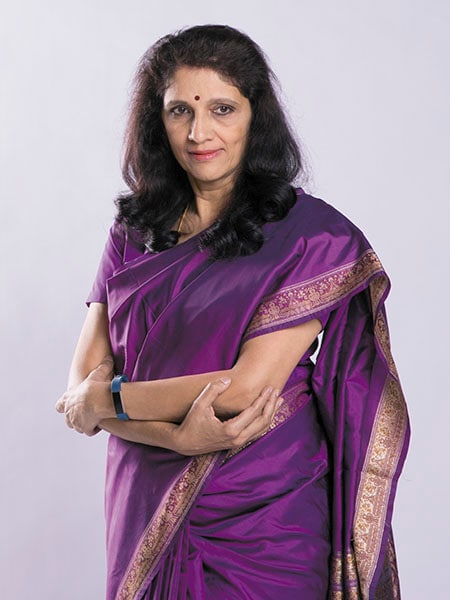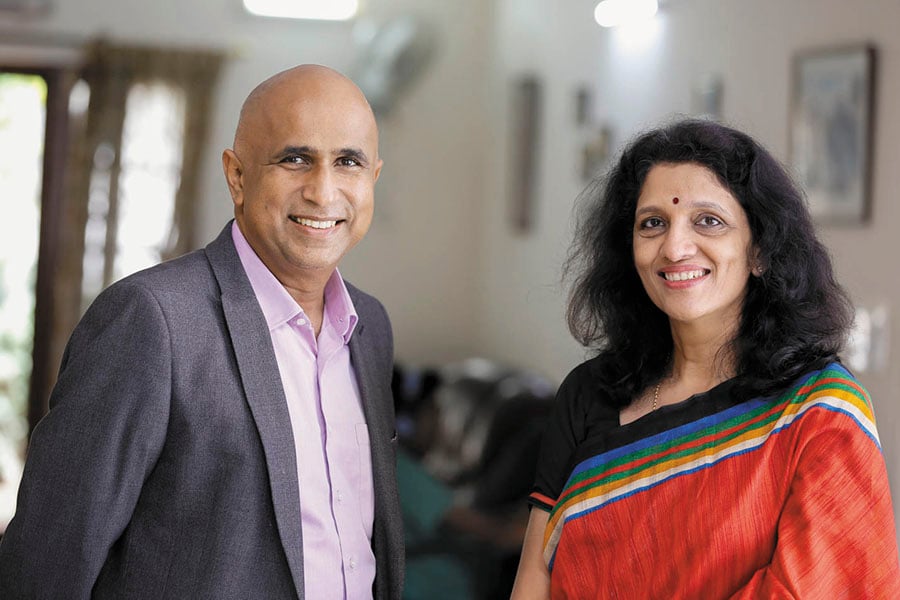How serial entrepreneur Meena Ganesh stays on top of the game
Over a career spanning three decades, Meena Ganesh has seemingly done it all. Now, the 53-year-old has an eye on the bourses for her four-year-old health care startup, Portea Medical



After passing out of IIM Calcutta, Meena Ganesh spent a decade in the corporate sector before turning entrepreneur
Image: Mexy XavierMeena Ganesh, a recent addition to the board of governors of her alma mater, Indian Institute of Management Calcutta (IIM-C), has been cutting down on travel in February-March. As much as possible. Her son, Atishay, the younger of her two children—daughter Akshita is 26—has his Class XII board exams coming up. Like any concerned parent, Meena’s focus is on ensuring Atishay gets what he wants: Admission into one of the top science or engineering colleges in India.
“I take constant updates from him—from morning till night. I discuss which topics he studied, how much he got in his preparatory tests, why his marks were low in certain subjects, and what’s the plan to improve his grades,” says Meena.
So much so that, in January, when Atishay’s school hosted an event in which the students were asked to write a letter to their parents, “My letter read: ‘I know Ma, you are really trying hard and pushing me hard to score well in my exams. And for that I might be angry with you sometimes, but I understand why you are doing it’,” says a visibly happy Meena.
Her joy is understandable. Ask any parent, and they’ll term this—appreciation from the child—a serious achievement. And for Meena, the 53-year-old co-founder and CEO of health care startup Portea Medical, which has raised close to $50 million in venture capital funding, it comes hand-in-hand with managing a storied career that has spanned over three decades.
Meena is the proverbial ‘does-it-all’ professional. A successful serial entrepreneur, “she is the co-founder of a top early-stage venture firm, and a former CEO of a top MNC [British retailer Tesco] in India. Quite a rare background among her peer group,” points out KP Balaraj, co-founder and managing director, WestBridge Capital India, a venture investment firm.
WestBridge was an early investor in TutorVista which was co-founded by Meena and her husband K Ganesh before they started Portea Medical. WestBridge was among those who reaped healthy returns when the company was sold.
“Meena is a great leader and businesswoman, who is not just a role model for women but for all aspiring entrepreneurs,” says Nandan Nilekani, co-founder of Infosys and former chairman of the Unique Identification Authority of India. “I’ve known her since her days at Microsoft, then at Tesco, and now as CEO of Portea Medical. She brings passion, attention to detail, and strategic thinking to all that she does.” Nilekani has also been a sounding board to Meena on Portea, and on a few other startups that the Ganeshes have co-founded.
But the startup ecosystem may have missed out on Meena had she not had a change of heart in time. As she will tell you, she had planned an entirely different life for herself.
[qt]Meena was a person who could sit in a meeting with seven men and give back as much as she got.[/qt]
Turning entrepreneur
Growing up in the insulated surroundings of the South Eastern Railway Colony (then called BNR Colony) in Kolkata—her father was an engineer with the Indian Railways and her mother a homemaker—Meena didn’t have a ringside view of women as professionals. “In those days, I didn’t see too many career-oriented women,” recalls Meena.
After she completed Class X, the family moved to Chennai where Meena was sent to Jawahar Vidyalaya Senior Secondary School, now famous for its alumnus Sundar Pichai, CEO of Google Inc.
Meena, who holds a bachelor’s degree in science, with honours in physics, from Women’s Christian College, had no business ambitions in her earlier days. “I was very clear that I would be a professor and take up research,” she says. However, she realised during her undergrad years that “there was more to life than just my scientific inclinations”. It helped that her elder brother had studied at IIM-C and was making her aware about the possibilities of a career in management.
Having decided to go in that direction, Meena got selected by all the IIMs (at the time)—Ahmedabad, Bangalore and Calcutta—in 1983. “I decided to go and study in IIM-C because my brother studied there and I had a natural affinity for Kolkata, having grown up in the city.” It was a providential decision personally too: It was at IIM-C that Meena met K Ganesh, her batch-mate, whom she married in 1985. Meena married K Ganesh, serial entrepreneur and her IIM-C batchmate, in 1985
Meena married K Ganesh, serial entrepreneur and her IIM-C batchmate, in 1985
Image: Mallikarjun Katkol for Forbes India
The first decade after B-school was spent in the corporate sector. Having specialised in information technology (IT) and finance at IIM-C, she joined the then fledgling NIIT as an IT consultant in New Delhi, in 1985. By the time she left NIIT—seven years later—she was overseeing the operations of 40 of the company’s training centres in north India. She then joined consulting firm PricewaterhouseCoopers (PwC), where she was involved in the financial re-engineering of NTPC Ltd, India’s largest energy conglomerate.
Ganesh Natarajan, chairman of startup incubator and investment company 5F World and former vice-chairman and CEO of Zensar Technologies, was Meena’s boss for a couple of years at NIIT. His enduring impression of her is that of a go-getter, and that, he says, manifests in her body of work as well. “If you look at her career, it demonstrates that ability to understand what needs to be done, build quickly, and then make it happen,” he says.
Meena’s success isn’t surprising for many reasons, not the least of which is her gumption. At a client meeting Natarajan had attended with Meena, somebody had used a four-letter word in the midst of discussions. Meena, Natarajan recalls, responded with the same four letters. “Meena was a person who could sit in a meeting with seven men and give back as much as she got,” he says.
In 1995, Meena left PwC to join Microsoft to set up the company’s consulting division in New Delhi. “We were the front end, working with corporates to help them design their solutions around Microsoft’s technologies,” explains Meena. It was during her five-year stint at Microsoft that she learnt how companies—software developers and service providers—developed their business models and scaled them up.
For Meena, who had shifted base from New Delhi to Bengaluru in 1997, this exposure to the software development ecosystem had, in some ways, planted the seeds of a potential startup idea. “I was exploring the next big wave and that’s when I realised that outsourced customer support from India will be a big market to play in,” says Meena. In 2000, she teamed up with husband Ganesh, who had already donned the entrepreneurial hat, to found CustomerAsset.
It would be their first work venture together: Meena was the chief operating officer, while Ganesh the chief executive officer. “Ganesh was an entrepreneur even before I was. So, I watched him at close quarters and understood what it takes to be an entrepreneur and learnt from him,” says Meena.
undefinedPortea handles more than 1 lakh home visits a month in 21 cities and has a workforce of 4,500[/bq]
CustomerAsset focussed primarily on US-based internet companies that needed customer support, and used the internet as a medium to deliver it. But, with the dotcom bust at the turn of the millennium, the Ganeshes had to change their business model to focus on call centre needs of large corporates. “At that time, large IT companies were building their technology solutions with BPO services and we felt that an exit was the right move,” says Meena. It was sold to ICICI Bank in 2003 for $20 million. Today, the company is listed on the Indian bourses as Firstsource Solutions Ltd and is part of the RP-Sanjiv Goenka Group.
Meena, then, would work with British retailer Tesco, to build its back-office technology support centre in Bengaluru, for five years before getting back to the startup firmament.
Meanwhile, Ganesh had started online tutoring company TutorVista in 2006, and Meena joined him in 2008 with the specific objective of seeing how the company could address the Indian market at a time when internet and mobile phone penetration were poor. “I studied the education market in India and looked at where people spent their money. Much of it was spent on schools and post-school tutoring. Those were the two areas we targeted,” she says. TutorVista acquired a startup called Edurite that developed digital content for schools. “We utilised their strength, and it became a very successful business. We sold our solutions to 3,000 schools in India. We also set up tutoring centres.”
TutorVista kept growing, and, in 2011, British publishing and education company Pearson PLC bought a majority stake in it for $213 million by 2013, Meena and Ganesh had fully exited the venture, enjoying handsome returns as fruits of their labour. “Her real capability in terms of managing diverse constituencies and making her mark in difficult areas came with TutorVista and now Portea Medical,” says Natarajan.
Homing in on success
The next step for the Ganeshes was starting GrowthStory—which they refer to as a venture builder platform—in 2013. Through GrowthStory, they generate ideas, build a business plan, and usually put together a core team, largely comprising those with whom they have worked before. More often than not, they make an initial investment and then rope in venture capital investors. Some of the successful ideas to come out of GrowthStory include online grocery retailer BigBasket, online jewellery store BlueStone and, of course, Portea Medical.
Portea started off as an at-home post-operative health care provider. But, over the last three years, it has evolved to cater to primary care, chronic care, and geriatric care as well. It handles more than 1 lakh home visits a month across 21 cities and has a workforce of about 4,500 people. Hospital chains such as Manipal Hospitals have outsourced their at-home health care services to Portea Medical.
Mahendran Balachandran, partner at venture capital fund Accel, which has invested in Portea Medical, says, “As a CEO, she [Meena] brings positive leadership and direction. She has built, arguably, India’s largest home health care company.” He believes the most enduring facet of Meena is her “understated style of management” and “cool head”. “She gives great attention to detail, and empowers her team members to deliver results,” he adds.
Her partner-in-crime, Ganesh, points to her ability to do “big-picture/blue-ocean thinking and place customers at the centre of whatever business she envisions”. He adds, “She can also as quickly do a deep-dive into the micro-tasks that need to be executed to meet desired objectives.” And with Portea, he says, “She has built a business that was non-existent in India.”
In fact, Meena is optimistic about Portea’s potential to the extent that she is even considering listing it on the bourses. “The thought is always to build a business, scale it up, and make it the best in its space. With Portea, I’m very bullish about taking it to an IPO stage and staying with it long-term,” she says.
A consummate professional, Meena even made time for the Forbes India photo shoot in Mumbai, away from her work and son in Bengaluru. But ask her the stereotypical work-home balance question, and she answers in a characteristic matter-of-fact way. “I don’t compartmentalise my work and home,” she shrugs. “I maintain a balance between both. There is no fixed 9-5 slot.”
First Published: Mar 15, 2017, 06:40
Subscribe Now